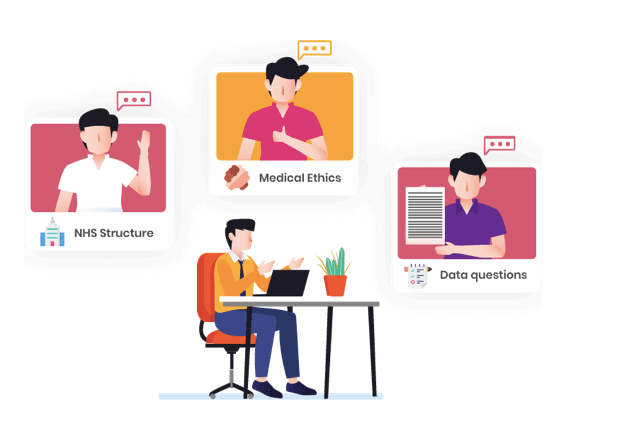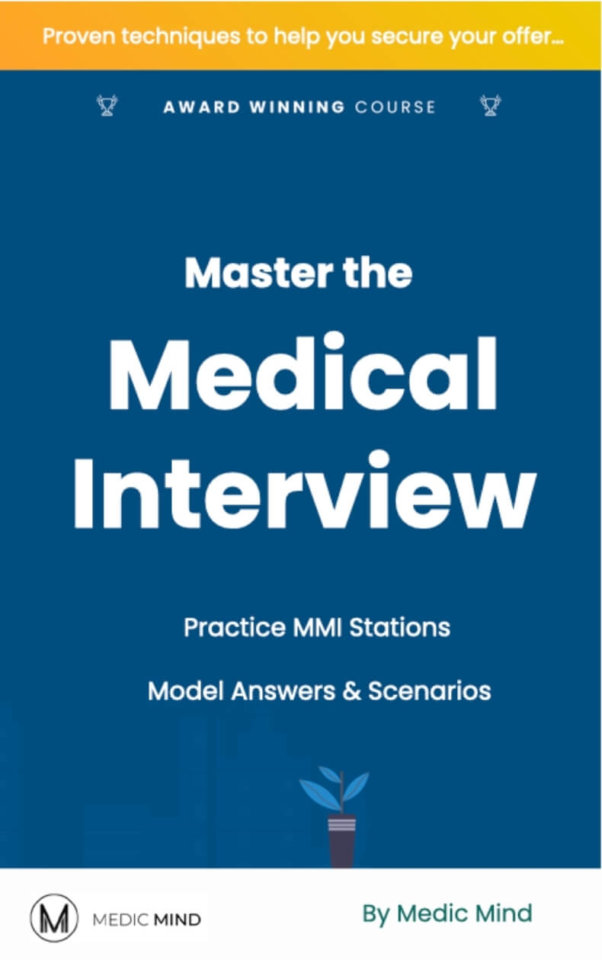Loading...

Interview Questions: Work Experience
Talking about your work experience can feel like a broken record. You have made sure you have done plenty of it, written about it in your personal statement, but now we want you to talk about it in your interview. It may seem laborious but it’s important to capitalise off your experiences and demonstrate what you have learnt to the examiner in your interview.
What should you talk about when asked about your work experience?
1. What you saw
When we say “what you saw” we mean what skills did you see the doctors on your work experience demonstrate? Try to pick a specific example when you saw the doctor demonstrate the skill e.g whilst breaking bad news. If you kept a work experience diary now is the time to go back through what you wrote down to find these examples.
2. What you learnt
What did the experience teach you? Was it insightful and why was it so?

3. What skills did you identify
What essential skills did this experience demonstrate? It could be teamwork, communication, leadership, work-ethic, competency… the list is endless, but what skills have you identified from your work experience.
4. Why is this skill so important for a doctor?
Once you have identified the skills demonstrated tell the examiner why they are so important. How did the doctor’s actions benefit the patient? Did the doctor have a positive impact? Were the doctor’s actions something you would like to replicate as a doctor? Don’t be afraid to highlight how things can go wrong or if there was a skill the doctor didn’t demonstrate adequately. An example being ineffective communication could lead to awful situations for patients, one example being the Bawa-Garba case – read more about the Bawa-Garba case here!
Once you have thought about each of these points you can start to formulate your answers. If you are doing an MMI interview you are in the lucky position of being able to use just a few experiences to demonstrate multiple skills, as each interviewer with each question will be brand new and won’t know your previous answers. If you are doing a panel interview, you won’t be able to do this. However, you can make reference to your previous answers, which the examiners will remember from the earlier answers you gave. Below is an example of how you can use the same example to discuss your work experience in our model answers.
Kickstart your Interview Prep
Model Answers:
Tell me about what you learnt on your work experience
During my work experience I was able to shadow a foundation doctor in a busy A&E department. There is one particular patients care which stood out to me, it was an elderly gentleman who had severe chest pain and shortness of breath. I observed the way that each member of the team worked so well together to treat the patient effectively and efficiently. Both the doctor and the nurses attending the patient knew the roles that each other were doing and communicated well with each other so that they didn’t get in each others way with their tasks. I found this insightful as to how it is essential to work together as an effective team, not just for a good working environment with colleagues, but also for efficient treatment of patients.
Another thing I learnt from my work experience was how having a good work-ethic is essential, not just as a doctor but as a medical student too. During my week-long placement across various wards in my local hospital I was speaking to an A&E consultant about the difficulties of the job, so that I had a realistic understanding of the career and all that it entails. The consultant told me about the long hours, the lengthy training involved at medical school and throughout your career with the constant desire to learn. He also spoke at length about the issues that impact him personally, such as staff shortages in the NHS and how this means he often works overtime. What inspired me was how none of this was off-putting to neither myself or the consultant. He was so passionate about training the next generation of doctors and healthcare professionals as well as loving his job. This illustrated to me that although there are many struggles as a doctor that you may face, that requires your hard work and determination to succeed. Something that I feel, along with my passion for medicine will enable me to succeed at both medical school and as a future doctor.
Top Tips:
- Use the same examples – not within the same answer, but you can use the same work experience to demonstrate several skills. This was partially demonstrated above where the same experience was used to demonstrate 2 seperate skills.
- Don’t forget to be precise – Tell the examiner enough detail for them to fully understand what you saw and what you learnt from that experience. Be careful not to carry on too much and use all your time at the station on 1 example though!
- Use 2-3 examples – In around 5 minutes you have time to discuss a few examples in enough detail. It is essential not to just list your experiences, as this won’t show that insight and reflection that the examiner is looking for.
Frequently Asked Question
→What is the best way to answer questions about work experience in an interview?
The best way to answer questions about work experience in an interview is to provide specific examples of your accomplishments and contributions in previous jobs. Be prepared to discuss how you’ve demonstrated skills like leadership, problem-solving, and teamwork, and how those skills have contributed to your success.
→What should I highlight about my work experience when interviewing for a new job?
When interviewing for a new job, you should highlight your accomplishments and contributions in your previous roles, as well as any specific skills or experiences that are relevant to the new job. Emphasize how your past experience has prepared you for the challenges of the new position and how you can add value to the company.
→How do I explain gaps in my work experience during an interview?
When explaining gaps in your work experience during an interview, it’s important to be honest and direct. Explain why you left your previous job, what you did during the gap, and how you stayed productive during that time. If possible, highlight any relevant skills or experiences you gained during the gap that could benefit the new employer.
→How do I talk about my work experience without sounding arrogant?
To talk about your work experience without sounding arrogant, focus on the specific contributions you made to your previous employers, rather than just listing your accomplishments. Be humble and grateful for the opportunities you’ve had, and be sure to give credit to others who helped you along the way. Show how you’ve learned from your experiences and are excited to bring that knowledge to the new role.
→How do I showcase my soft skills during an interview when discussing work experience?
To showcase your soft skills during an interview when discussing work experience, provide specific examples of how you’ve demonstrated those skills in previous jobs. For example, describe a time when you effectively communicated with a difficult colleague or demonstrated leadership during a crisis. Emphasize how those skills have helped you achieve success in your previous roles and how you can apply them to the new job.





Was this article helpful?
Still got a question? Leave a comment
Leave a comment